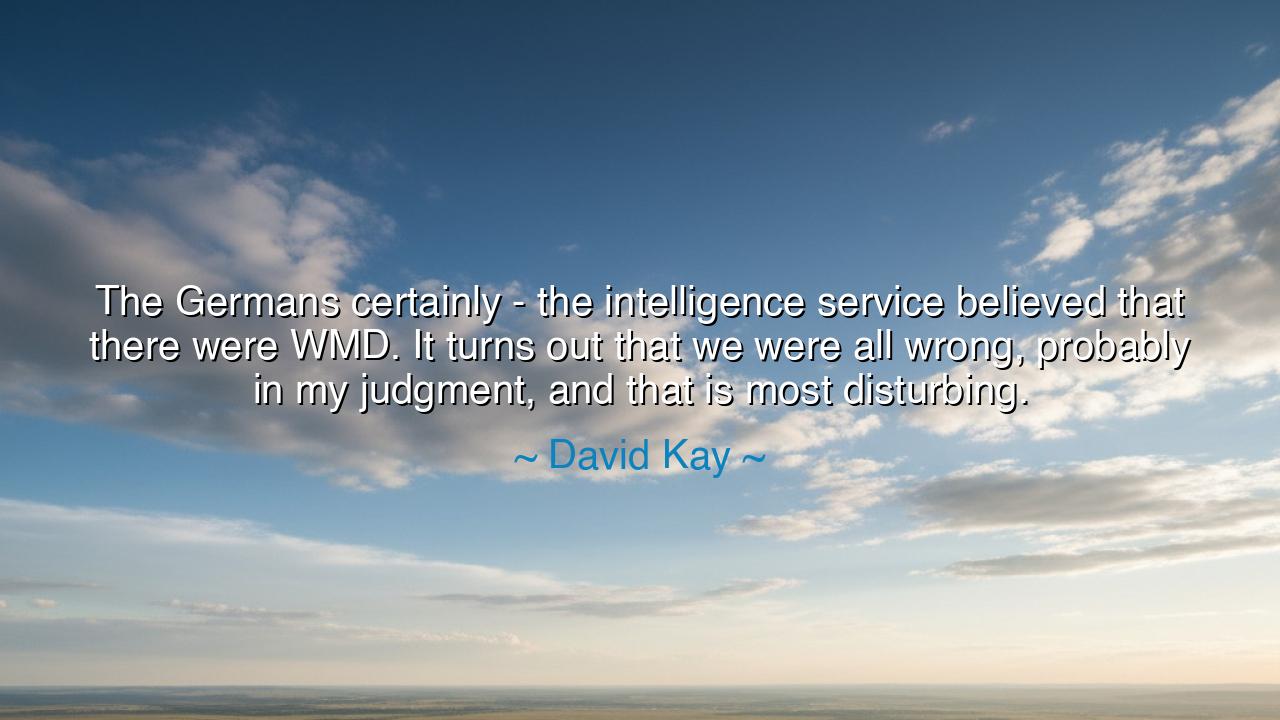
The Germans certainly - the intelligence service believed that
The Germans certainly - the intelligence service believed that there were WMD. It turns out that we were all wrong, probably in my judgment, and that is most disturbing.






When David Kay declared, “The Germans certainly—the intelligence service believed that there were WMD. It turns out that we were all wrong, probably in my judgment, and that is most disturbing,” he spoke as one who had stood within the heart of power and witnessed the frailty of human certainty. His words, though rooted in the modern age of intelligence and warfare, carry a resonance as ancient as the fall of empires: the warning that even the wise may be deceived when fear, pride, and assumption cloud the pursuit of truth.
Kay, an American weapons inspector and former chief of the Iraq Survey Group, uttered this reflection after the Iraq War began in 2003. The world had been told that Weapons of Mass Destruction (WMDs)—chemical and nuclear arms—were hidden within Iraq’s borders, and that their existence justified invasion. Yet when the smoke of war cleared and the ruins were searched, none were found. The intelligence upon which entire nations had acted proved hollow. Kay, charged with uncovering the truth, came forward not to defend power, but to confess its error. His words, “we were all wrong,” are not only political—they are moral, carrying the humility of a man who dared to confront the limits of human knowledge.
This statement reflects a lesson the ancients knew well: that certainty is a dangerous illusion, and that the mightiest powers fall when they mistake belief for truth. The philosopher Socrates, standing before his accusers, claimed that his wisdom lay in knowing that he knew nothing. Had the leaders of the world heeded that ancient humility, the tragedy that followed might have been averted. For when men believe without questioning, they build their decisions not on stone, but on sand—and the structures of their certainty collapse beneath the weight of reality.
History offers countless mirrors to this truth. Consider Troy, that great city of legend. The Trojans, believing the wooden horse to be a gift, opened their gates and sealed their doom. Or recall the Maginot Line of France, a wall built in confidence that could not withstand a changing war. In each case, as in Kay’s lament, the fall was not from weakness, but from false assurance. The same thread binds ancient tragedy and modern intelligence: the failure to doubt one’s own conviction.
When Kay calls the revelation “most disturbing,” it is not only because the intelligence community erred, but because millions paid the price for that error—soldiers, civilians, and nations alike. His words remind us that the pursuit of truth is not an academic game, but a sacred responsibility. Intelligence, whether political or personal, must be rooted in honesty, humility, and the courage to question even what seems obvious. Without these virtues, knowledge becomes arrogance, and power, unrestrained by wisdom, turns destructive.
The lesson is eternal: seek truth with humility, and act only with awareness of error’s shadow. The wise do not rush to judgment, nor do they confuse conviction with correctness. They listen to many voices, weigh evidence with patience, and hold their conclusions lightly, knowing that all human knowledge is fallible. The greatest danger lies not in being wrong, but in refusing to admit it.
So let these words be remembered by all who wield influence, whether in nations or in their own lives: doubt is not weakness—it is strength in disguise. Question what you believe. Re-examine what you know. Let humility be your guide, and truth your master. For as David Kay discovered, and as every age has learned before him, the cost of misplaced certainty is great, but the reward of honest reflection is wisdom—and wisdom, once found, can prevent the ruin of worlds.






AAdministratorAdministrator
Welcome, honored guests. Please leave a comment, we will respond soon